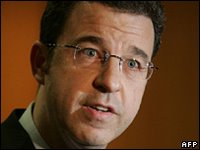"The Syrian government has, in particular in the last three months, formally complied with nearly all of the Commission's previous requests for assistance."
In his first report since taking over the UN inquiry into the murder of Rafiq Al-Hariri, Serge Brammertz says Syria is co-operating much more than it was before.
But he includes a warning that he expects more of the same:
"Despite these encouraging steps, it is important to note that the Commission will ultimately judge co-operation of the Syrian authorities on the merits of the information provided and the promptness with which its requests are being accommodated."
And for the first time the UN investigators have revealed that Bashar Al-Assad has agreed to be interviewed next month - Brammertz (below) is likely to travel to Damascus for that. He will also interview Vice President Farouq Ash-Sharaa (who was the Foreign Minister until earlier this year).
 It was a major complaint of Detlev Mehlis that Syria wasn't co-operating. Although, he praised the Syrian government's help when he was allowed in to Syria and when Syria sent all the witnesses that he demanded. But in his final report he slammed Syria, and said that he feared for his own life.
It was a major complaint of Detlev Mehlis that Syria wasn't co-operating. Although, he praised the Syrian government's help when he was allowed in to Syria and when Syria sent all the witnesses that he demanded. But in his final report he slammed Syria, and said that he feared for his own life.
That created a springboard for Bush to attack Syria from.
But it seems like the probe into the death of Hariri has turned a page. No more politicking, no more 'statements' from independent investigators, no more pushing the envelope. Just a fair international inquiry into the murder of a Lebanese statesman.
But why has the inquiry changed its face? Because of a change of mood in Syria, or because of a change of leadership in the UN Commission?
If it is the latter, it casts a dangerous shadow over the work of Detlev Mehlis.









